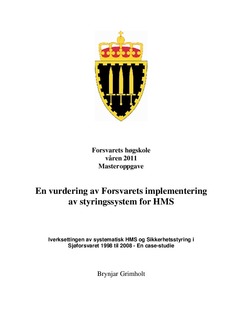En vurdering av Forsvarets implementering av styringssystem for HMS. Iverksetting av systematisk HMS og Sikkerhetsstyring i Sjøforsvaret 1998-2008: en case-studie
Master thesis
Permanent lenke
http://hdl.handle.net/11250/100006Utgivelsesdato
2011Metadata
Vis full innførselSamlinger
- Masteroppgaver [466]
Sammendrag
Systematic health, environmental and safety activities in enterprises are laid down by Royal Decree of 6 December 1996. These regulations require a systematic implementation of measures to improve conditions in enterprises in regard to (Arbeidstilsynet, 1996): · the working environment and safety · prevention of damage to health or disturbances to the environment from products or consumer services · protection of the external environment against pollution and improved treatment of waste The armed forces cannot be considered an ordinary enterprise. Due to the special circumstances under which the armed forces conduct some of their activities, these regulations are not covering all their operations. The armed forces are therefore expected to regulate and comply with the intentions of the rules. The consequence derived from this fact is a strategy stated in 1998 with focus on health, environment and safety to cover all type of activities in the armed forces. This study places focus on the implementation of the strategy for systematic health, environmental and safety activities in the Royal Norwegian Navy. The main idea is to examine how the strategy was interpreted and realized by the planners in the organization. The study will cover both conditions regulated by the law, and also study the implementation of safety management system in the Royal Norwegian Navy. The main objective in the study will be to examine to what extent the implementation of the strategy has been a controlled activity. To analyze the development of the strategy implementation I argue that the theory of Henry Mintzberg on Strategic Programming is a useful tool. By analyzing interviews and documents in the two categories “role of the plan” and “conduct of the strategic programming” I will be able to state to what degree the implementation has been a controlled process. Some of the findings in this study are pointing at lack of attention to the role of the plan as a control device. There is also stated lack of detailing of the plan in the conducting of the strategic programming, and subsequent challenges in the further implementation. The study points out the key role middle management play in the strategy implementation.
